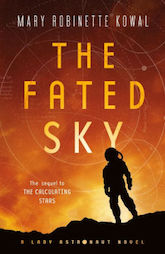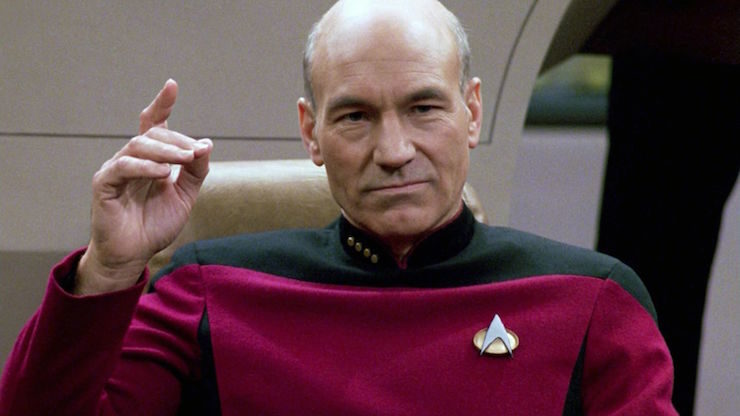With the announcement that Sir Patrick Stewart will be reprising his signature role of Jean-Luc Picard for a planned Star Trek television series on the CBS AllAccess streaming service, speculation has run rampant about what that series could possibly be. Will he return to the Enterprise, or will the series be set planet-side? Will Picard join the admiralty, or will he be retired to his vineyard? Will he lead Star Fleet Academy—a series idea I’ve seen suggested for twenty years—or lead Picard’s 11, where Jean-Luc gets the gang back together to rob the heck out of the Ferengi?
There’s so much speculation because we know so little about the show at this point, just that Stewart is playing Picard and that it’s set 20 years after Nemesis. And yet, that’s enough to get me excited because it means the franchise is doing something it hasn’t done in 15 years: it’s moving the story forward.
Ever since Enterprise debuted in 2001, the franchise has focused on nostalgia and retellings. A prequel, a reboot (Star Trek 2009)*, and another prequel (Discovery). Creators were clearly trying to recapture the thrill of the original series: explorers seeking out new life and new civilizations under the threat of a galactic war.
But by nature of being prequels and reboots, very little of what they find is actually new. It’s just more Klingons and Romulans, Vulcans and Andorians, mirror universes and Khan. Oh, and Sarek, worst Dad in the universe. Additionally, retelling stories from the ’60s—even stories that were impressively progressive for the ’60s—means reviving some sexist, racist, and colonialist tropes that are well over fifty years old.
Nostalgia can be done well. Personally, I quite like nuTrek (Star Trek: Beyond is probably the second or third best Star Trek movie) and I’m coming around on Discovery. But for a franchise that’s about progress and the capital ‘F’ Future, saying that the history of space exploration ends the moment Data fires himself at an enemy ship, and all the interesting stories happen before that, is weirdly cautious and backward-looking. This new series, by necessity, must be truly new and take the franchise where it hasn’t gone before.
Yes, bringing back a fan favorite actor as a fan favorite character is a nostalgia play, but it also means the series must be in continuity with Star Trek: The Next Generation (unlike Discovery, which is ambiguous about whether it takes place in the William Shatner or Chris Pine timeline). And it must be about what happens next: after Picard saves the Romulan Empire from a coup; after the Dominion War reshapes Federation politics; after Voyager returns from the Delta Quadrant with a friendly Borg, a self-determined hologram, and technology from the far-far-far future.
One of the great pleasures of Next Gen is seeing how concepts introduced in the original series developed over time. Kirk and crew constantly grapple with Romulans, Klingons, omnipotent space assholes, and artificial intelligences. Now a Klingon and an android are bridge crew, but the Romulans and jerk gods are still problems. How great will it be to see ideas from Next Gen, Deep Space Nine, and Voyager moved further into the future?
Buy the Book


The Fated Sky
Is there lasting peace with the Romulans or the Founders? Are Cardassians now accepted members of the Federation? If contact with other Quadrants in the galaxy is common, will Star Fleet explore new galaxies? Or new dimensions, like the Mirror-verse or wherever Species 8472 is from? Or new eras, where they have to enforce the Temporal Prime directive? Is there a burgeoning synthetics rights movement? Or eugenics rights for enhanced beings? Did they ever get around to solving that pesky Q problem?
Most importantly, the writers can introduce truly new, unexplored ideas and concepts and take the franchise places it couldn’t go before. Things I can’t predict or guess at because they are intentionally different. They can introduce new life and new civilizations, new technology, new phenomena, new problems, new solutions. Discovery introduces interdimensional fungi and giant tardigrades, but still has to explain why no one uses or even mentions such world-bending technology even a few years later. That won’t be an issue for the new series. The writers can also inject contemporary politics and issues into the new show, so that a series set four hundred years in the future can feel like it was written this year and not during the Johnson administration.
In the end, it almost doesn’t matter what the literal premise of the new show is. Picard could be living on his family farm or leading all of Star Fleet on a mission of cosmic importance or running a school for gifted students dealing with impossible sci-fi problems (that one sounds familiar, for some reason). But whatever he’ll be doing, he’ll be doing it in the future’s future’s future, a space we haven’t seen before, where surprise, change, and growth will be possible. The new series can and must do something that Star Trek hasn’t done in way too long: venture boldly into the unknown.
*yes, thanks to time-travel shenanigans, Star Trek 2009 takes place after Nemesis, but only for Spock Prime, not in any way that truly matters.
Steven Padnick is a freelance writer and editor. By day. You can find more of his writing and funny pictures at padnick.tumblr.com.










